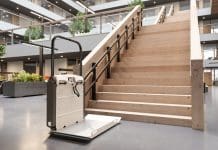Trudi Beswick, CEO of the RICS Project of the Year 2019 winner Caudwell Children, is calling on the government, councils and the wider construction industry to prioritise truly accessible design as part of the “build, build, build” recovery plan
With prime minister Boris Johnson announcing “the most radical reforms to our planning system since the Second World War” and rallying the UK to “build, build, build”, I am calling on government and the construction industry to use this opportunity to reconsider exactly who they are building for.
Our understanding of the world has changed; it’s time for our buildings to catch up.
Across all sectors, all industry, all walks of life, people are questioning what they want to retain from our pre-Covid-19 world and what we want to change.
The opportunity to rethink and reset how we work and live may only come around once in a generation so we must seize the opportunity and ensure that positive change is born from the ashes of such catastrophic disruption and tragedy.
Each of us, in whatever field we work, has the ability to reassess what we do and question whether it was really fit for purpose for our modern world.
Catering for a neurodiverse population
Building Regulations born from the 1995 and 2005 revision of the Disability Discrimination Act (where effectively employed) only serve to improve accessibility for people with different mobility and vision needs.
Our improved understanding of the wider spectrum of accessibility must now be considered, to make our buildings more inclusive and to increase society’s understanding and accepting or all our differences.
Some 15% of the UK’s population are neurodivergent, meaning that the brain functions, learns and processes information differently. Neurodivergence includes Attention Deficit Disorders, Autism, Dyslexia and Dyspraxia.
These, along with the wider spectrum of neurological conditions including epilepsy, dementia and Parkinson’s, are not currently considered with existing Building Regulations.
Hence, the vast majority of buildings and built environments in the UK, and around the world, do not cater to a neurodiverse population.
Built environments that fail to consider the sensory experience for a neurodiverse population also fail in creating truly accessible environments for everyone to use and enjoy, a defining principle of accessible design and the hallmark of quality architecture.
Six years ago, I started the design and construction of the Caudwell International Children’s Centre, a 60,000 sq ft purpose-built facility for the provision of support services for disabled children, including autism assessments and interventions.
As I do with every project, I placed stakeholder engagement at the very heart of the decision-making, routinely seeking direct input from a diverse group of the building’s potential users to understand their needs and requirements.
The feedback we received from those stakeholder groups presented us with our key design principles and directly informed design decisions throughout the construction of the innovative new building.
Ultimately, this process led to the creation of the UK’s first purpose-built, independent facility for the assessment, intervention and research of neurodevelopmental conditions, including autism.
The completed project, which officially launched in May 2019, has also been recognised for its innovative approach to the design process by winning (among others) the RICS National and Regional Project of the Year, Design in Mental Health Project of the Year and the Charity Times Property Innovation Award.
But recognition for our project should and will only be the beginning; it is my mission to influence and motivate the wider construction industry to follow examples of best practice within the industry and adopt the same principles of stakeholder engagement and a broader approach to accessibility.
Embracing diversity
Understanding, accepting and embracing all the wonderful diversity within our society will make stronger communities, more effective businesses and a healthier society.
Now is the moment to ensure the legacy of Covid-19 is a legacy for all, a legacy that sets the bar for accessibility around the world.
To join me on this mission please share this call for support as widely as possible and help spread the word before the walls start going up…and shutting people out.
To discuss how you can support this call for action please contact me on trudi@caudwellchildren.com or follow me on Twitter @trudibeswick

Trudi Beswick
Chief executive officer
+44 (0)345 300 1348














